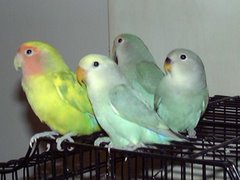Points to be Considered while Buying a New Lovebird
Regardless of whether you are buying your new birds from a pet breeder or a shop, you will always have to be alert to any possible underlying problems. You should first of all pay attention to the lovebird’s behavior; you’re better off not buying a bird that shows stereotypical or apathetic behavior or a bird that is very nervous.
The birds feather should be shiny and should be neatly aligned. The bird should furthermore not show any signs of ailments or itchiness. This may be an indication of a parasite.
Make sure you pay attention to its beak; it should have the right shape. The beaks of the some birds don’t grow correctly and as a result they do not wear down very evenly.
Make sure you count the number of toes as well. If one or more toes are missing this may have been caused by aggressive birds living in the same cage or otherwise by frost. Even though this can do little harm in slight cases, such as mutilation is nevertheless a flaw.
Make sure you do not buy birds that are clearly gasping for air or that keep closing eyes or keep their eyes half-open.
Hold the lovebird in your hand and study the area around its anus. It should be clean and should not contain any sticky or wet feathers or even bits of droppings.
Feel the lovebird’s breastbone. You would better off not buying a bird with a protruding breastbone and the same applies to birds with swollen stomach or bluish skin color.
Get to now the diseases of lovebirds before you choose a specimen for you. Once you’re familiarized with the disease symptoms, you can easily recognize them in the birds. Some of the diseases can’t be identified by a layman. Hence it is highly advisable to buy your lovebird from someone reliable or seek the help of an experienced bird-keeper.
If you’re going to breed the lovebirds, it is not entertained to procure the birds from a same nest. In addition to this a faithful or good breeder won’t try to fob you off with lovebirds that are related when you explain what you intend to use them for.
The birds feather should be shiny and should be neatly aligned. The bird should furthermore not show any signs of ailments or itchiness. This may be an indication of a parasite.
Make sure you pay attention to its beak; it should have the right shape. The beaks of the some birds don’t grow correctly and as a result they do not wear down very evenly.
Make sure you count the number of toes as well. If one or more toes are missing this may have been caused by aggressive birds living in the same cage or otherwise by frost. Even though this can do little harm in slight cases, such as mutilation is nevertheless a flaw.
Make sure you do not buy birds that are clearly gasping for air or that keep closing eyes or keep their eyes half-open.
Hold the lovebird in your hand and study the area around its anus. It should be clean and should not contain any sticky or wet feathers or even bits of droppings.
Feel the lovebird’s breastbone. You would better off not buying a bird with a protruding breastbone and the same applies to birds with swollen stomach or bluish skin color.
Get to now the diseases of lovebirds before you choose a specimen for you. Once you’re familiarized with the disease symptoms, you can easily recognize them in the birds. Some of the diseases can’t be identified by a layman. Hence it is highly advisable to buy your lovebird from someone reliable or seek the help of an experienced bird-keeper.
If you’re going to breed the lovebirds, it is not entertained to procure the birds from a same nest. In addition to this a faithful or good breeder won’t try to fob you off with lovebirds that are related when you explain what you intend to use them for.







 Free Ads For Bloggers
Free Ads For Bloggers


No comments:
Post a Comment